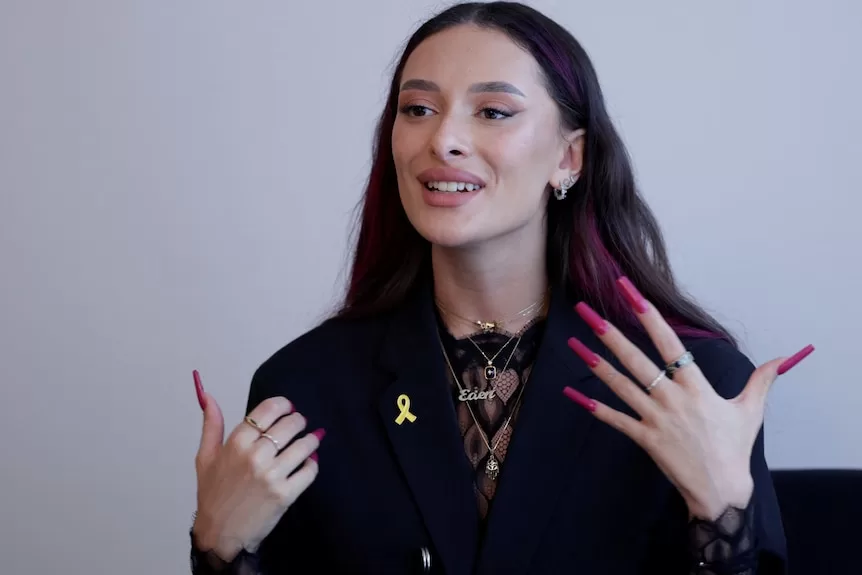The Eurovision Song Contest is back for another year and, once again, an Australian act will be taking to the stage.
It may seem a bit weird Australia is a competitor in a contest that starts with “Euro” given we’re so far away from the continent.
But we’ve been competing for years now.
Why is Australia in Eurovision?
In short, because Australian broadcaster SBS has been such a big supporter of the event.
It’s been covering the contest since 1983 – a whopping four decades – but Australian acts have only been taking the stage for 10 years.
It kicked off in 2014, when iconic Australian singer Jessica Mauboy was invited to be a guest singer during the interval.
The following year, the European Broadcasting Union (EBU) invited Australia to compete as a wildcard entry.
This was back during the contest’s 60th birthday and was all about “building bridges”.
That year, we sent Guy Sebastian to compete and he came in fifth place.
After this success, the SBS struck a deal with the EBU for Australia to stay on the bill until 2023.
There was a question mark about Australia’s future in the contest after Eurovision 2023, but in early December it was confirmed that Australia would take part this year.
But Australia isn’t the only non-European country in the contest, with nations like Ukraine and Armenia also competing.
Who is competing for Australia?
A duo called Electric Fields.
Their song is called One Milkali (One Blood).
Which countries are competing?
This year, there are 37 Eurovision Song Contest participating countries:
Here’s the full list of countries:
- Albania
- Armenia
- Australia
- Austria
- Azerbaijan
- Belgium
- Croatia
- Cyprus
- Czechia
- Denmark
- Estonia
- Finland
- France
- Georgia
- Germany
- Greece
- Iceland
- Ireland
- Israel
- Italy
- Latvia
- Lithuania
- Luxembourg
- Malta
- Moldova
- Netherlands
- Norway
- Poland
- Portugal
- San Marino
- Serbia
- Slovenia
- Spain
- Sweden
- Switzerland
- Ukraine
- United Kingdom
Is Israel competing in this year’s Eurovision?
Yes.
Israel agreed to modify the lyrics of its original song, which was called October Rain and is now titled Hurricane.
The EBU said the original lyrics referenced the Hamas attacks on an Israeli music festival on October 7, which triggered Israel’s war in Gaza.
This year, Israel will be represented by Eden Golan, who did not write the song.
She was selected to be Israel’s contestant after winning a televised singing contest.
Golan didn’t attend the opening ceremony on Sunday due to Holocaust Memorial Day in Israel, Swedish broadcaster SVT said.
But she spoke to Reuters in an interview on Monday.
“I come here to show my voice, to share my love, my gift from God and to hopefully make people feel something and leave a mark in their souls and to unite by music,” she said.
Why is Israel in Eurovision?
Because its broadcaster is a member of the EBU, so it has a place in the competition like Australia.
Except while Australia is only relatively new to the competition, Israel has been competing in Eurovision for more than 50 years.
“Israel made its debut in the Eurovision Song Contest in 1973 as the first non-European country granted permission to participate in the event,” the Eurovision website says.
“The EBU allowed Israel to participate since the country’s broadcaster was already one of its members.”
As this year’s contest approaches, there are growing calls from some critics to ban Israel from the competition, in the same way Russia was banned in 2022.
The EBU told international news syndicate Agence France-Presse it decided late last year that Israel could participate.
“The Eurovision Song Contest is a non-political music event and a competition between public service broadcasters who are members of the EBU,” the union’s director-general, Noel Curran, said.
“It is not a contest between governments.”
Mr Curran said in the case of Russia, it was the Russian broadcasters themselves who were suspended from the EBU “due to their persistent breaches of membership obligations and the violation of public service values”.
However, this hasn’t stopped the calls for Israel to be banned, with protests expected at the event.
Golan was asked how she felt about the possibility of demonstrations.
“It’s up to the people what to do,” she said.
“They have the right to speak their voice, but I’m focusing on my part, which is giving the best performance, and on the good, on the good vibes, the good people.”
Where is Eurovision being held this year?
In Malmö, Sweden.
That’s because Sweden won last year’s event.
Malmö is bracing for possible unrest during the week, although police have said there have been no concrete threats against the event.
When is Eurovision?
The first semifinal will be held in Sweden on Tuesday night but, because of the time difference, it’ll be Wednesday morning in Australia.
That’s the one Australia will be in.
The second semifinal will be on Friday morning.
And the grand final will be on Sunday morning.
They’ll all start at the following times:
- 5am AEST: ACT, New South Wales, Queensland, Tasmania and Victoria
- 4:30am ACST: Northern Territory and South Australia
- 3am AWST: Western Australia
Where can I watch Eurovision in Australia?
It’s being broadcast and streamed by SBS.
So you can watch it on free-to-air television or SBS On Demand.
We’ll also be live blogging the finals, so if you’re planning an early-morning viewing party, we’ll be on hand to keep you company.
ABC with Reuters
